Author: Admin
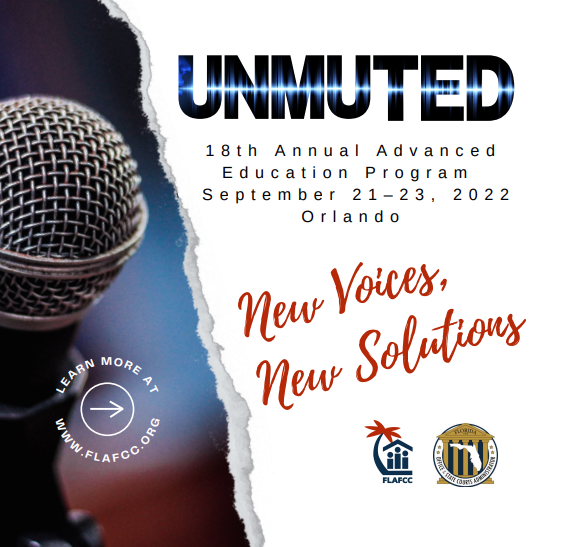
Check out the 2022 program to learn more about the type of presentations FLAFCC conducts.
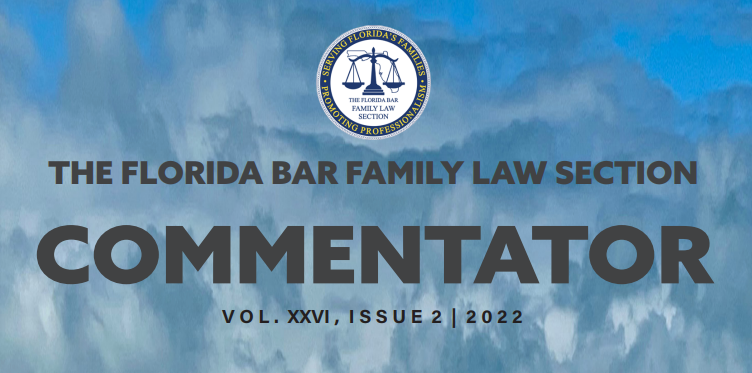
By Linda Fieldstone, Maria C. Gonzalez and Honorable Michelle Morley
I. Gray Divorces:
The divorce rate for those ages 55 to 64 is on the rise according to the U.S. Census Bureau..1 The high- profile divorce of Bill Gates (age 65) and Melinda Gates (age 56) after 27 years of marriage added to the statistic of gray divorces. Not surprisingly, the state of Florida ranks among the top 10 states with the highest gray divorce rates.2 One explanation for the increase may be that life expectancy has increased. Why stay in an unhappy relationship when you have a significant number of years left to enjoy? A recurring topic in gray divorces is who handled the finances, investments and savings and if both parties are now able to adequately handle their respective finances. Gray divorces often present issues or decisions relating to retirement, social circles, where to reside, healthcare and social security, among others. It also brings with it decision- making minus the customary partner to consult with and the impact or role that adult children may now play in their single parents’ lives.
II. Remove Emotions From the Process:
If “the devil is in the details” then the dollars are in the emotional and non-legal arguments that go hand-in-hand with gray divorce cases. Sometimes parties to a dissolution of marriage are manipulated by the emo tions inherent in the proceedings. For example, guilt causing unnecessary concession; hope for reconciliation rousing extravagant generosity; jealousy driven unreasonable demands; fear precluding progress. When multiple non-parties and loved ones are fanning the flames of those emotions the chance that the case will be bogged down by non-legal issues increases, particularly if the non-parties are exerting influence over fragile aging persons. Regretabbly, those emotions may serve to fuel a party’s zeal to obtain a given result in court and some attorneys fail to recognize how to best counsel and advise their clients to consider alternative dispute resolution methods. Instead, deposition, mediation and the courtroom all offer opportunities to render emotions raw, intentionally or not. Everyone adopts a win-lose mentality. Alliances forge on both sides. Rather than focusing on outcomes that are fair and in the best interest of each party, the focus remains emotional, progress is delayed and costs of litigation mount.
III. How is Eldercaring Coordination Different?:
Eldercaring coordination offers a different tactic. • First, eldercaring coordination is private and confidential. What is discussed is not open to the public like a courtroom. This may serve to be extremely valuable to the family members involved. • Second, it is forward-focused, helping the participants move on from past vendettas and personal interests to focus on the needs of their aging loved one. While concentrating everyone’s attention on the needs and safety of the aging loved one, the Eldercaring Coordinator (“EC”) also redirects the parties and non-party participants away from history and blame. The EC helps them capitalize on their respective strengths and abilities, what each can do to care for their aging loved one or persons who surround the older adult to keep them safe. • Third, addressing matters in eldercaring coordination does not require a written motion, coordination of a hearing date and time, filing of a notice of hearing, waiting weeks for the hearing, subpoena and preparation of witnesses, eliciting of damaging testimony and development of adversarial argument; waiting for a ruling or drafting and circulating a proposed order. Instead, eldercaring coordination involves contacting the EC to advise of an issue; meeting with the EC; sometimes by phone, sometimes in person, sometimes virtually; sometimes immediately and other times within days; a discussion of the issue with all affected parties; pushing away hurt feelings, grudges, and other emotional baggage to focus the energy on a positive solution to the issue. Everyone learns to communicate and negotiate more effectively with one another so that everyone feels that they have been heard. When legal issues remain, the parties return to court for a streamlined hearing that uses everyone’s time most efficiently because the emotionality is removed from the courtroom. • Fourth, the number of hearings and the length of hearings is reduced when eldercaring coordination is used to address the emotional and non-legal issues. The parties are better prepared for mediation because they can remain issue focused instead of conflict focused. Judicial effort may now focus on issues of law; and • Fifth, the financial cost is significantly reduced for each party due to the reduced number and length of hearings, and the division of the EC’s fees among the parties instead as compared to each party bearing their own litigation expenses. The older adults, to the extent possible, are making their own decisions rather than handing the decisions over to a judge. From the Court’s perspective, when a case is referred to eldercaring coordination, ideally the priority of family hostility and conflict has now significantly shifted. The work of the EC has enabled the family to become more cognizant of the needs and wishes of their aging loved one. They now recognize how the conflict historically interfered with those needs and wishes. There is less emotionality at hearings. Fewer hearings are needed. Emergencies are being dealt with outside of court. Hearings are shorter, are addressing strictly legal issues, and are streamlined.
IV. How Does Eldercaring Coordination Work?:
The EC is appointed typically for a period of two years. The first few months enable a relationship to develop between the family members and the EC. The family becomes more familiar with the process and the EC helps them identify issues as they relate to their aging loved one(s). They work together to develop a dynamic “eldercaring plan” to provide for the aging person’s changing needs, care and well-being, and also serves to chart their progress. Perhaps one of the greatest tools in the eldercaring coordination toolbox is the use of an “eldercaring plan,” “a continually reassessed plan for the items, tasks, or responsibilities needed to provide for the care and safety of an aging person which is modified throughout eldercaring coordination to meet the changing needs of the beloved senior and which takes into consideration the preferences and wishes of the aging person. The plan is not a legally enforceable document, but is meant for use by the parties and participants.”3 As the family assesses what has been accomplished since their last meeting and what needs to be achieved until their next meeting, the eldercaring plan provides a constantly changing roadmap to provide for the older adult’s changing needs, as well as a chart of the progress the family has made within the eldercaring coordination process. When services are needed to assist the older adult and family members, the EC can refer them to resources that will meet those needs, including financial planners, accountants, therapists, faith-based support, Veterans Administration, mediators, or lawyers, although typically the parties are already represented when they first appear in court. After some transparent and positive conversation within the confidentiality of the eldercaring coordination process, families might realize that dissolution of the aging person’s marriage is not the best outcome for the aging person. They may begin to appreciate the daily efforts of the spouse, who has the most exposure to the difficult transitions and challenges of aging experienced on a daily basis. Or, the arrangement might be to maintain the couple separately, but not dissolve the marriage so that such marital benefits as continuing health care coverage, or pension benefits, remain in place. If dissolution of the marriage is the best outcome, and everyone has had the chance to acquire the skill to put aside emotions, the dissolution process becomes simpler. Throughout the dissolution process and following, the family may have more time to respond to the transitions of their aging loved one. The eldercaring plan will gradually and responsively lay out the steps of those transitions. If there are unanticipated circumstances associated with those transitions, the family can save money and obtain results more rapidly by returning to eldercaring coordination instead of court to sort things out. Compliance with a solution that family members worked out themselves is more likely. The Court is not having to find time for emergency hearings. The family is not destroying itself or the marriage of their aging loved one with accusations and reproach. The older adult is not at the center of family conflict anymore. The needs, wishes and safety of the aging person have become the priority rather than vendettas and grudges. If the EC is needed for more than two years, the appointment may be extended by the court.
V. Some History:
Eldercaring coordination has been studied since its inception by Virginia Tech University through pre- and post-surveys4 of initial eldercaring coordination cases which revealed the following: • 100% of the judges reporting described eldercaring coordination as “a very effective intervention for high conflict families”; 82% of magistrates and eldercaring coordination program administrators described it as “very effective”, with the rest responding “somewhat effective.” • 81% of the judges reported that court appearances were reduced as a result of eldercaring coordination. • Risks to elders were reduced as ECs identified: abuse/neglect; coercion; exploitation; vulnerability/deception/coercion; isolation; unsafe environment; physical challenges; caregiver capacity; and substance abuse/mismedication. Eight circuits in Florida (5th, 7th, 9th, 12th, 13th, 15th, 17th, 18th) served as pilot project sites for eldercaring coordination between 2015 and 2021. During this period, other conflict resolution processes, such as elder mediation have gained momentum. However, just as with parents in conflict regarding their minor aged children, mediation and court processes appear to augment the discord when family dynamics are overwrought with conflict. Similar to parents of younger families who require a different process (i.e., parenting coordination) to meet the challenges of their animosity, older families in conflict need a similar process suited to them as well. With one in four adults over the age of 50 likely to divorce5, eldercaring coordination is a promising option for older families to address issues regarding the care and safety of their aging loved ones outside of a contentious courtroom. Eldercaring coordination was specifically developed to meet the unique needs and characteristics of older families in conflict regarding the care and safety of an older adult. Guidelines for Eldercaring Coordination6 were created in 2014 by twenty Florida statewide entities and twenty U.S. and Canadian organizations7 who worked collaboratively in Task Forces convened by the Florida Chapter of the Association of Family and Conciliation Courts (FLAFCC) and the Association for Conflict Resolution (ACR). In addition to older adults and their families, these esteemed collaborating organizations were highly aware of the implications of the growing number of aging persons entering the court system, already beset as Baby Boomers hit the “elder” age. According to the Population Reference Bureau (PRB), 2018 Census Bureau’s projects that, next to California, Florida has the greatest number of Americans 65 or older8, with one of every four Floridians over 65 by 2030 according to the Florida Health Care Association9. The expanding caseload of the court, that is already limited financially, is likely to result in greater delays in court actions which could keep elders in already precarious positions where family members are at odds over the control of their care. StayWell/WellCare, a Medicare/ Medicaid provider in Florida, formally recognized that family conflict is a health issue for elders. Traditional court processes, based on a win-lose mentality, often exacerbate conflict. Eldercaring coordination safeguards older adults from family conflict by providing them a private forum, in a timely manner, to address non-legal care issues outside of court actions.
VI. Florida’s § 44.407, Florida Statute:
Florida is the first state to enact a statute on eldercaring coordination, spearheaded by the Florida Chapter of the Association of Family and Conciliation Courts (FLAFCC) with sponsorship by Senator Dennis Baxley and Representative Brett Hage. Florida’s Legislators confirmed their endorsement of the process through their unanimous votes throughout the legislative process including the floor of both Houses. Effective July 2021, § 44.407 F.S.10, Florida judges now have specific legislative authority to refer older adults and their families to an eldercaring coordinator (EC), an extensively trained and experienced high conflict resolution specialist, who: • Enables more effective communication, negotiation and problem-solving skills; • Offers education about eldercare resources; • Facilitates the creation, modification or implementation of an eldercaring plan; • Recommends how to resolve non-legal conflict; and • Makes procedural decisions within the scope of a court order or with the parties’ prior approval.11 Similar to parenting coordinators, ECs are qualified by each Florida circuit they serve. According to § 44.407 4(5)(a), Florida Statute, ECs have at least a master’s degree and are licensed or certified in Florida in specific fields of practice such as psychologists, physicians, nurses, family mediators, attorneys or professional guardians. In addition, as highly trained conflict resolution specialists, ECs have completed training in a family mediation program certified by the Florida Supreme Court, a 16-hour elder mediation course and 28-hour eldercaring coordination training; the latter two components will eventually be combined to form a total 44-hour course that is certified by the Florida Supreme Court12. The Florida Alternative Dispute Resolution Rules and Policy Committee is working on the rules, procedures and forms to provide the Court’s framework for eldercaring coordination in the state. Because eldercaring coordinators are appointed for a period of up to two years, they are able to assist the older adult and family throughout the transitions of the aging process. This gives the EC the opportunity to identify patterns that pose risks for the aging person, including possible abuse and exploitation. Since ECs have the time to establish relationships with the families, it is not unusual for past transgressions to be exposed while current motivations of the family members surface over time. When combating members of blended families are a component of a gray divorce, that may include old and new spouses, biological and step-children, in-laws and grandchildren all competing for control. When the multitude of those involved, including non-parties, are intensifying emotions and strengthening allegiances rather than promoting cooperation for the sake of the aging person, the case may be overwhelmed by non-legal issues that may further threaten the care, safety, happiness and autonomy of the aging person. The 2-year term of the EC provides the time needed to reinforce collaboration even when connections between blended family members may be permanently ruptured. ECs are mandated reporters to the Florida Child and Adult Abuse Hotline. According to the World Health Organization13, while one of 6 older adults is likely to experience abuse, only 1 in 24 cases are reported. In Florida, 75% of verified reports include family members as perpetrators.14 While an investigator is exploring allegations of abuse, the EC continues to shield the elder and keep the family conflict at bay.
VII. Is it Multigenerational?:
Family conflict regarding an aging person affects all generations. Sibling arguments may threaten their own marriages and romantic relationships due to the heightened emotional stress involved as well as depleted resources – time and money – now spent on legal actions including experts hired to prove their cases in court. Family alliances threaten long-term relationships that include the youngest in the family. Sometimes children are no longer permitted to see their beloved grandparent or great-grandparent, aunt, uncle or cousin. ECs are constantly emphasizing the adverse effects of family discord and helping the family discover options to move from blame and the past toward healing in the future where children have better modeling for resolving conflict. As stress decreases for everyone, the children are learning how to build on strengths rather than building walls as their social capital broadens once again. VIII. Conclusion: ECs help families develop a support system, starting with the strengths each family member brings to the process. By learning to collaborate more effectively, the older adult and family are more cooperative when working with essential service providers whether obtaining legal and financial advice, mental health support, professional care or medical treatment. As the older adult’s voice is elevated over personal agendas of family members, resources are no longer duplicated, but are optimized to provide for the elder’s best interests and preferences, without competing impositions and distractions. Mediation becomes more effective when the parties are able to focus on the issues, having vented the conflict and the blame, and learned in eldercaring coordination how to put that aside. In every location interested in eldercaring coordination, there has been a heightened awareness and use of elder mediation, which will be especially useful if issues regarding wills and estates resurface after the older adult’s death. Not only is the aging person protected from the family conflict throughout the process, but the family has the opportunity to create a legacy that would make their aging loved one proud. Linda Fieldstone, M.Ed., Co-Chair of the Association for Conflict Resolution Elder Justice Initiative on Eldercaring Coordination, is former president of Association of Family and Conciliation Courts and its Florida Chapter. She was instrumental in the development of parenting coordination in Florida and internationally, while serving as Supervisor of Family Court Services in the 11th Judicial Circuit, Florida, providing services to families in conflict for 26 years. In 2018, Ms. Fieldstone presented on eldercaring coordination to the United Nations and was honored with the Sharon Press Excellence in ADR Award from the Florida Supreme Court for her “visionary leadership, professional integrity, and unwavering devotion to ADR” and the “Dispute Resolution Center Award of Appreciation in recognition of her work with Judge Michelle Morley in “institutionalizing eldercaring coordination with the Florida Court System.” Maria C. Gonzalez, Esq. is managing partner at the law firm of Maria C. Gonzalez, P.A. in South Florida and practices exclusively in marital and family law. She is Board Certified in Marital and Family Law (1997) and is past-Chair of The Family Law Section of the Florida Bar. She is a Fellow of the American Academy of Matrimonial Lawyers and past-Chair of The Florida Bar Marital and Family Law Certification Committee. Ms. Gonzalez is current President of the Florida Chapter of The Association of Family and Conciliation Courts (FLAFCC) and achieved Board Certification in Family Law by the National Board of Trial Advocacy (NBTA). She is on the Board of Directors of The Florida Bar Foundation. In 2018, Ms. Gonzalez was appointed to the Ad Hoc Committee tasked with updating the Bounds of Advocacy which establishes aspirational ethical goals for family law attorneys. She was appointed and also served on the Florida Supreme Court’s Commission on Professionalism and Civility. Ms. Gonzalez co-authored the electronic communication statute, Section 61.13003, Florida Statutes, which took effect in 2007. She is past- President of the First Family Law American Inn of Court. She was the recipient of The Honorable Raymond T. McNeal Professionalism Award and of The Honorable Hugh Stearns Community Service Award. She has been featured in Florida SuperLawyers and selected as one of the top 5% Marital and Family lawyers in Florida (2006 to 2021) and recognized as “Top Lawyers in South Florida” by South Florida Legal Guide. She has an “AV” rating by Martindale-Hubbell and is listed in the Bar Register of Preeminent Women Lawyers. Ms. Gonzalez is a Florida Supreme Court Certified Family Law Mediator and a Certified Marital Law Arbitrator by the American Academy of Matrimonial Lawyers. She frequently lectures and publishes on a variety of family law topics and is a strong advocate to promote Board Certification. Judge Michelle Morley has been a Circuit Court Judge, Fifth Judicial Circuit, Sumter County, assigned to family, probate, guardianship and mental health Divisions as well as other civil matters since 2007. She is an inaugural winner of the FLAFCC 2021 Trailblazers Award and received a 2021 Florida Dispute Resolution Center Award of Appreciation. She was inducted into the Stetson University College of Law Hall of Fame in 2019. She is the recipient of the 2019 William E. Gladstone Award for her judicial leadership and service to Florida’s children. She is Co-Chair of the Florida Eldercaring Coordination Initiative. She is served as a Special Advisor to the Clerks & Comptrollers’ Guardianship Task Force. She is a member of the U. S. Department of Justice Elder Abuse Intervention Model Advisory Board. She was both a Stakeholder and an Advisor to the Florida W.I. N.G. S. program and served on the Florida Supreme Court’s Guardianship Workgroup. She serves on the Florida Court Education Council. She is Chair of the Florida Judicial Qualifications Commission. She has presented at the United Nations, the U. S. Department of Justice, the International Federation on Ageing Global Conference on Ageing, Florida Judicial College, the Florida Conference of Circuit Court Judges Annual Conference, the College of Advanced Judicial Studies, the AFCC Annual National Conference, the FLAFCC Annual State Conference, the State of Florida Department of Children and Families Annual Summit, the Australia National Mediation Conference, National Council of Juvenile and Family Court Judges Annual Conference, the National College of Probate Judges, the Ohio Supreme Court, the Idaho Magistrate Judges Conference and the Michigan Probate Judges Conference.
Endnotes
1 U.S. Census Bureau, https://www.census.gov/library/ visualizations/interactive/marriage-divorce-rates-by- state.html. “Amongst adults aged 50+, the national divorce rate has roughly doubled since 1990. For those aged 65+, it has actually tripled, from 2 in 1,000 married persons to 6 in 1,000.” Divorce Rate in America [35 stunning stats for 2021], Jan., 28, 2021. (https://legaljobs.io/blog/divorce-rate-in- america/). 2 Allred, C. (2019). Gray divorce rate in the U.S.: Geographic variation, 2017. Family Profiles, FP-19-20. Bowling Green, OH: National Center for Family & Marriage Research. https://doi. org/10.25035/ncfmr/fp-19-20. 3 § 44.407 F.S. (1)(5)(g). 4 Reported at The National Guardianship Association Conference, November 15, 2019, “The Local and National Implementation and Evaluation of Eldercaring Coordination,” and the Gerontological Society of America Conference, November 16, 2019, “The Use of Eldercaring Coordination for Resolving Cases Involving Older Adults and High-Conflict Family Dynamics.’ 5 Report: Senior divorces have doubled in frequency, https://www.heinrichlaw.com/blog/2019/06/report- senior-divorces-have-doubled-in-frequency/, June 7, 2019. 6 Association for Conflict Resolution Guidelines for Eldercaring Coordinators (2015). Family Court Review, Vol. 53 No. 4, October 2015 545–564; ©2015 Association of Family and Conciliation Courts. 7 List of ACR and FLAFCC Task Force Organization: https:// www.eldercaringcoordination.com/-task-forces. Population Reference Bureau; retrieved 10/17/21: https://www.prb.org/resources/which-us-states-are-the- 9 Florida Health Care Association; retrieved 10/17/21: https://www.fhca.org/advocacy/silversolutions. 10 § 44.407 F.S.: http://www.leg.state.fl.us/statutes/ index.cfm?mode=View%20Statutes&SubMenu=1&App_ mode=Display_Statute&Search_String=44.407& U RL=0000-0099/0044/Sections/0044.407.html 11 § 44.407 F.S. (2)(d). 12 OSCA Memo 7/1/2021 13 World Health Organization. Elder Abuse, https://www. who.int/health-topics/elder-abuse#tab=tab_1 14 Robert Anderson, former Florida Department of Adult Protective Services.
Task Force on Family Court Intake
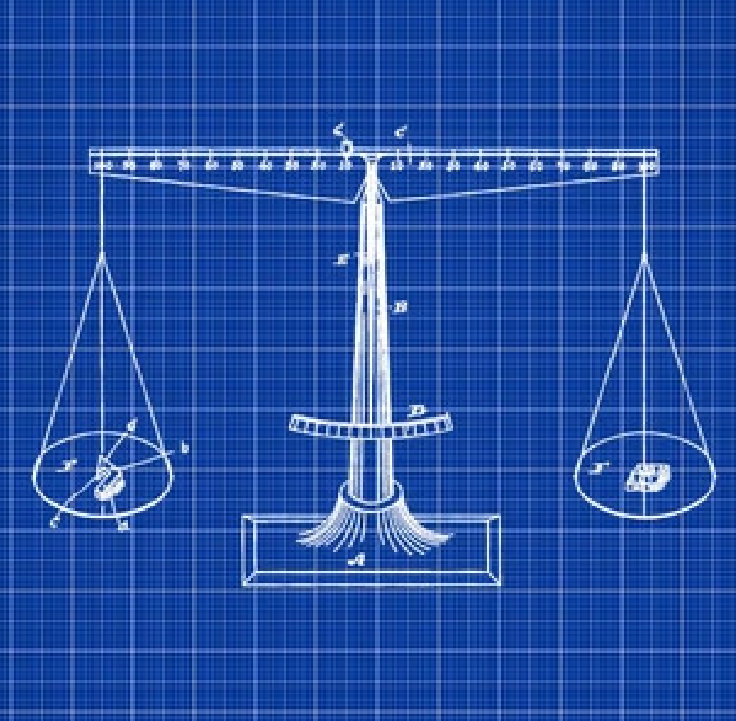
The Florida Bar Journal contains an excellent synopsis of recommendations by the FLAFCC-sponsored Task Force on Family Court Intake to create a universal model for processing cases from intake through outcome for Florida’s family courts.
FLAFCC members Robert J. Merlin, Judge Sandy Karlan, Linda Fieldstone, M.Ed., and Peggie Ward, Ph.D. co-chaired the tax force and shepherded its work through fruition.
Recommendations by the Self-Represented Parties in the Courts, Triage, Case Management, and Technology committees collectively represent a model for innovations that every circuit and county can adopt. A uniform family court intake system will improve efficiency, better serve the public, and help parties navigate the family court system more effectively. Read the article here.
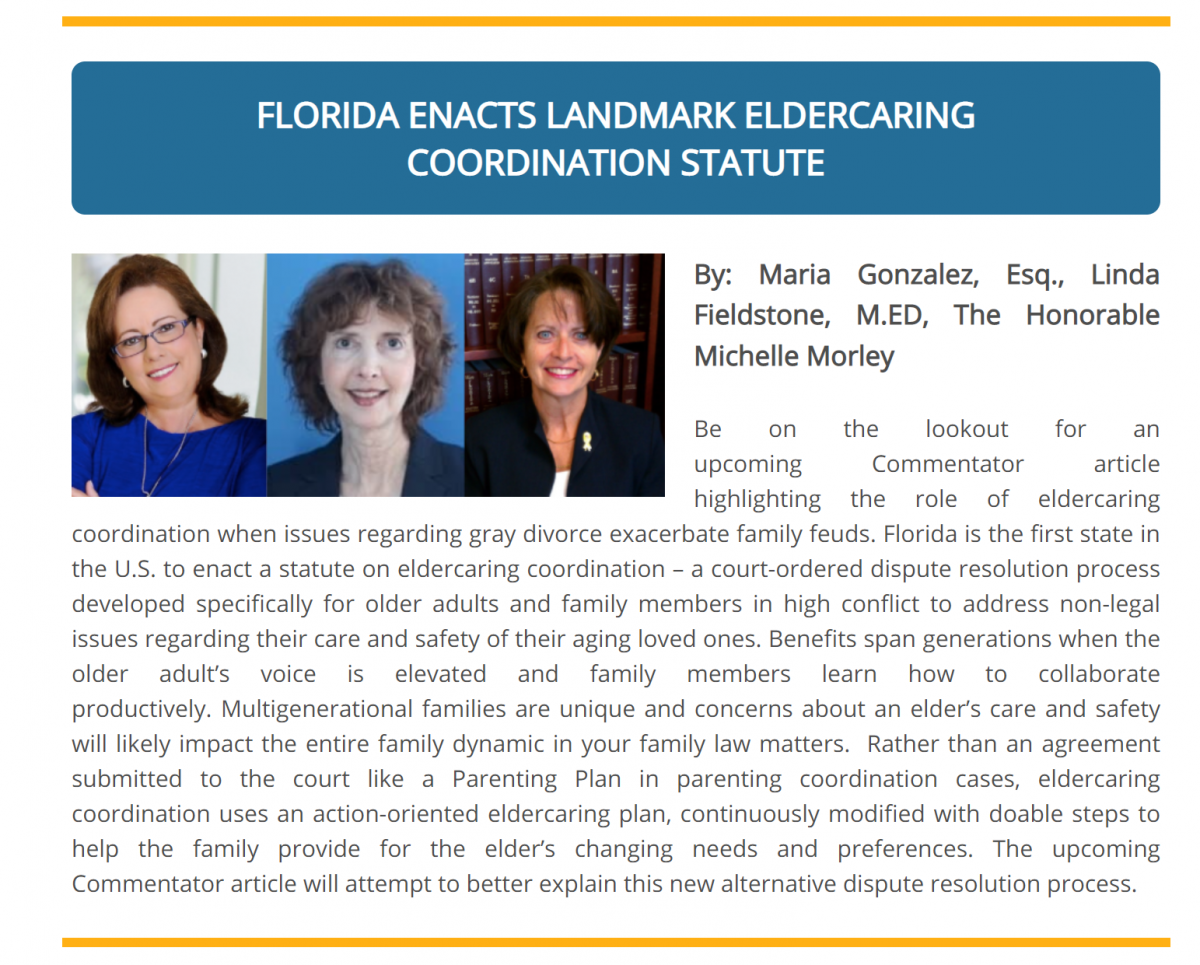
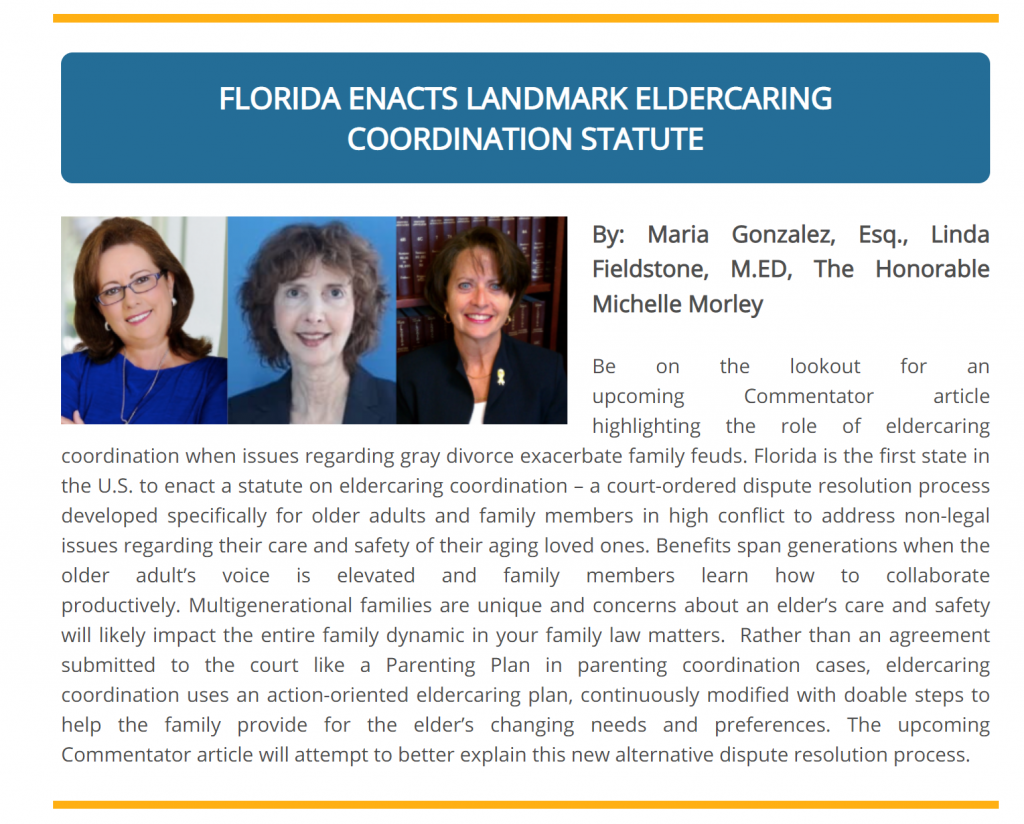
Thank you to The Florida Bar Family Law Section for publishing an announcement about Florida’s new eldercaring coordination statute. FLAFCC 2020-2021 President Maria Gonzalez, Linda Fieldstone, M.ED and the Honorable Michelle Morley wrote the article as a teaser for a longer article that will be published soon in the Family Law Section’s Commentator magazine. CLICK HERE to read more.
Notice of Annual Meeting

The FLAFCC Annual Meeting is at 10:00 a.m. Saturday, December 4, 2021 (Zoom log-in information to follow via e-mail on December 2, 2021)
Although we regret being unable to meet in person at the Florida Hotel & Conference Center for our Annual Meeting as originally scheduled, we look forward to meeting you virtually at the Annual Meeting.
In order to avoid scrambling through all your emails to find the meeting Zoom link, the Zoom link will be sent to you on Thursday, December 2, 2021 via email.
As members of FLAFCC you all know the value of belonging to this amazing International Organization which includes, but is not limited to:
• Access to the www.FLAFCC.org website with interesting and informative content
• The Family Law Review with cutting edge content
• Information throughout the year along with our Advanced Education Program that keeps us well informed of new information in our disciplines around the globe
• Numerous webinars from leaders in the field
THE OFFICERS AND THE BOARD LOOK FORWARD TO SEEING EVERYONE AT THE ANNUAL MEETING!!
Sincerely,
Maria C. Gonzalez
Maria C. Gonzalez, Esq
President, FLAFCC

